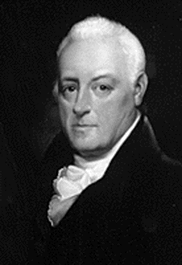Robert Yates(?), a non-signing Delegate to the Constitutional Convention, using the penname “Brutus,” publishes an anti-federalist essay, warning against ratification of the proposed Constitution for the united States will result in the establishment of a permanent warfare states. In paragraphs four and five he writes,
… A defensive war is the only one I think justifiable. …
The European governments are almost all of them framed, and administered with a view to arms, and war, as that in which their chief glory consists; they mistake the end of government—it was designed to save men[‘]s lives, not to destroy them. We ought to furnish the world with an example of a great people, who in their civil institutions hold chiefly in view, the attainment of virtue, and happiness among ourselves. Let the monarchs, in Europe, share among them the glory of depopulating countries, and butchering thousands of their innocent citizens, to revenge private quarrels, or to punish an insult offered to a wife, a mistress, or a favorite. …
NOTE: Although the identity of “Brutus” is not known for sure, many scholars believe him to have been Robert Yates, an Associate Justice of the New York Supreme Court.
[restored 10/3/2021]
Alexander Hamilton, a former Delegate, from New York, to the Constitutional Convention, using the penname “Publius,” publishes “Federalist #33,” claiming that the Elastic Powers Clause and the Supremacy Clause will not result the federal government overreaching the powers of the States. In paragraphs six and seven he writes,
Suppose, by some forced constructions of its authority: (which, indeed, cannot easily be imagined), the [f]ederal legislature should attempt to vary the law of descent in any State, would it not be evident that, in making such an attempt, it had exceeded its jurisdiction, and infringed upon that of the State?
If individuals enter into a state of society, the laws of that society must be the supreme regulator of their conduct. If a number of political societies enter into a larger political society, the laws which the latter may enact, pursuant to the powers intrusted [sic] to it by its constitution, must necessarily be supreme over those societies, and the individuals of whom they are composed. It would otherwise be a mere treaty, dependent on the good faith of the parties, and not a government, which is only another word for POLITICAL POWER AND SUPREMACY. [emphasis in the original]
[restored 11/30/2024]
Subsequent Events:
References:
Murray Dry, The Anti-Federalist: An abridgement, from The Complete Anti-Federalist by Herbert J. Storing, ed., (Chicago and London: University of Chicago Press, 1985), 145-46.
Federalist No 33 – The Avalon Project
avalon.law.yale.edu/18th_century/fed33.asp
Federalist No. 33 – Wikipedia
en.wikipedia.org/wiki/Federalist_No._33
Brutus VII
www.infoplease.com/primary-sources/government/anti-federalist-papers/brutus-vii
The Prophetic Antifederalists | Mises Institute
mises.org/library/prophetic-antifederalists


